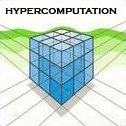Hypercomputation
 Currently, hypercomputation is still very theoretical and there is still enough to discuss. Hypercomputation concerns the study of computation beyond that defined by the Turing machine. It is a multi-disciplinary research area across a wide variety of fields, including computer science, philosophy, physics, electronics, biology and artifical intelligence.
Currently, hypercomputation is still very theoretical and there is still enough to discuss. Hypercomputation concerns the study of computation beyond that defined by the Turing machine. It is a multi-disciplinary research area across a wide variety of fields, including computer science, philosophy, physics, electronics, biology and artifical intelligence.
For a seminar to be given at the university, I’ve written with two fellow students a paper about the pre-hypercomputation history, explanation of hypercomputation and the philosphy of hypercomputation and artificial intelligence.
Paper (DUTCH) (518 KB PDF) (1.1 MB PS)
Presentation (ENGLISH) (1.6 MB PPT) (744 KB PDF)
Other interesting papers about hypercomputation:
Hypercomputation: computing more than the Turing machine, Toby Ord, 2002.
An introduction to the burgeoning field of hypercomputation – the study of machines that can compute more than Turing machines.
Computing Machines Can’t Be Intelligent (And Turing Said So), Peter Kugel, Computer Science Department, Boston College, 2001.
According to the conventional wisdom, Turing (1950) said that computing machines can be Intelligent. I don’t believe it. I think that what Turing really said was that computing machines computers limited to computing can only fake intelligence.
Toward a Formal Philosophy of Hypercomputation, Selmer Bringsjord and Michael Zenzen, 2002.
A survey of the field of hypercomputation, including discussion of a variety of objections.
Hypercomputation: philosophical issues, B. Jack Copeland, 2003.
A survey of the field of hypercomputation, including discussion of four a priori objections to the possibility of hypercomputation. An exegesis of Turing’s pre- and post-war writings on the mind is given, and Turing’s views on the scope of machines are discussed.